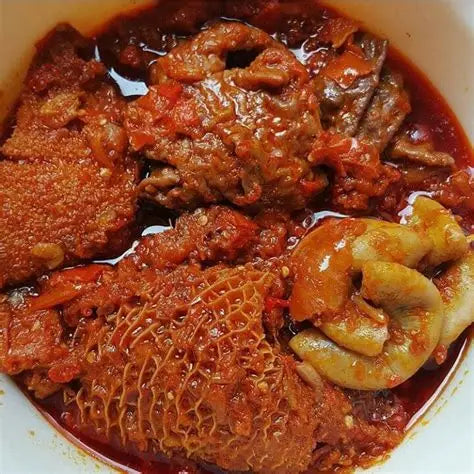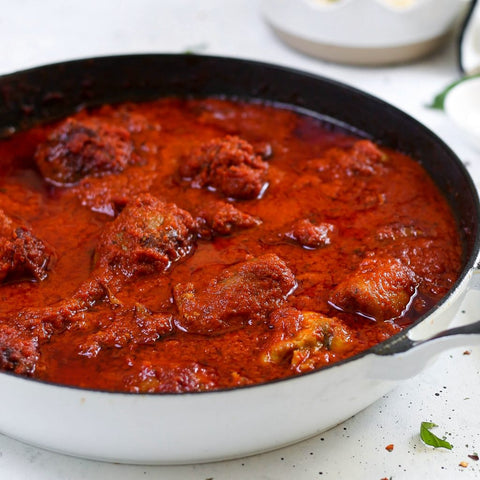Leaving Nigeria doesn’t just mean leaving behind family and friends. It means leaving behind the food. And to be frank, Nigerian food is not something you just “replace” abroad. You can try to explain it to others, you can try to cook it in your new kitchen, but some things just don’t taste the same outside Naija. Here are 20 Nigerian foods every Nigerian abroad misses and why they’re so unforgettable.
1. Ewa Agoyin

Ewa Agoyin is just beans and a burned pepper sauce… but is it really “just”? That sauce is a national treasure. People abroad will say, “I can make it at home,” but can they really? Burning the sauce to the edge of disaster without ruining it, that’s pure art and only Nigerian street food sellers seem to get it perfectly right. Abroad, no beans dish compares.
2. Pap and Akara

Saturday morning back home isn’t complete without hot pap and akara balls. Abroad, you can try oats or pancakes, but it doesn’t carry the same warmth. The soft pap, the crunchy akara, the peak milk flowing in and that smell in the morning air, nothing replaces it.
3. Garri Ijebu and Groundnut

Cold garri, sugar, groundnut and maybe milk if you’re feeling rich, some prefer Kulikuli, kai, tthis is survival food. Abroad, garri becomes luxury. One soak takes you straight back to hostel rooms, childhood afternoons, or late-night gist with friends.
4. Indomie

Simple noodles, right? Wrong. Nigerian Indomie is an entire experience. Abroad, you’ll find noodles, but they don’t taste like the Indomie “we know.” Spiced, fried with egg and pepper, or cooked with vegetables, Indomie is instant comfort.
5. Plantain

Dodo is dodo. Sweet, ripe, golden plantain fried beside beans, rice, or just eaten alone or with Garri, Nigerians abroad will never stop missing it. And no, the plantains abroad don’t always taste the same! Mba!
6. Party Jollof Rice

We need to emphasize this because this one deserves its own space. Party Jollof isn’t just jollof rice, it’s a whole experience. That smoky taste, the fried plantain on the side, maybe coleslaw, every Nigerian abroad craves it, especially when they see wedding pictures online. And don’t forget the oversized, well fried beef at the size. An experience indeed!
7. Egusi Soup

Ground melon seeds, palm oil, vegetables, meat, locust beans, dried fish, okporoko, chai, egusi soup is home. Abroad, you can cook it, but it never quite tastes like your mother’s pot. Paired with pounded yam or eba, egusi is that nostalgia you can taste.
8. Edika Ikong

Deep, rich, green soup filled with waterleaf, ugu, and more meat than vegetable. This is Cross River pride. Abroad, you may not always find the leaves, but when you do, the memory of family Sundays comes rushing back.
9. Amala and Ewedu

The way this food divides Nigerians! But those who love it, love it to death. Amala with ewedu and gbegiri is not just food, it’s identity. Haha….Abroad, finding the right flour, leaves and spices can be tough, and that’s why it’s one of the top foods people miss.
10. Masa (Waina)

This northern Nigerian snack which is soft rice cakes often served with suya or soup is something many abroad don’t even try to recreate but they terribly miss and dream about. The taste is too unique, too tied to the streets of Kano and Jos.
11. Yam Pottage (Asaro)

Boiled yam cooked down with palm oil, pepper crayfish and spices until soft and rich. Abroad, yam is not always easy to find, and when you do, it feels like finding treasure.
12. Suya

Even if you grill meat abroad, it’s not suya. Suya is smoky, spicy, wrapped in newspaper, with yaji pepper that makes you sweat. Abroad, the craving is constant.
13. Boli and Groundnut

Grilled plantain on the roadside, eaten with crunchy groundnut. Abroad, you can grill bananas if you like, but it’s never boli. That burnt-sweet taste is one of the most Nigerian things ever.
14. Pepper Soup

This is Nigeria’s medicine for everything. Cold, fever, heartbreak? Pepper soup will fix it. Abroad, you can try, but without the exact spices, it doesn’t taste the same.
15. Moi Moi

Soft, savory, and always a favorite. Back home, moi moi steamed in leaves has a taste that foil-wrapped versions can never match. Abroad, people used to say, “ah, it’s impossible to get the leaves.” But not anymore. Stores like My Sasun African Market now stock moi moi leaves, so you can recreate that authentic flavor in your own kitchen. The taste will carry you right back to Saturdays at home.
16. Abacha (African Salad)

From the East, this colorful cassava dish with palm oil, crayfish, and ugba brings home to life. Abroad, it’s rare to find the ingredients easily, which is why people miss it so much.
17. Agege Bread

The legend itself. Abroad, you’ll find fancy loaves, but none stretch and chew like Agege bread. Tear it open, dip in stew or beans, and you’re back home.
18. Gala and Lacasera

Only Nigerians understand this combo. Gala sausage roll with cold Lacasera apple drink is the official snack of Lagos traffic. Abroad, you’ll miss this most when hunger strikes between meals.
19. Okra Soup

Slimy, yes, but in the best way possible. To Nigerians, this soup with swallow is a meal that sticks to memory. Abroad, you’ll find okra, but the taste never feels exactly the same.
20. Ofada Rice and Ayamase (Designer Stew)

The aroma alone makes people nostalgic. That local rice with the green pepper stew is something no regular white rice abroad can match.
Final Thoughts 🌍
These foods are not only meals but Nigeria itself. They remind us of family gatherings, roadside sellers, school days, late-night gist, and everything in between. And while living abroad means you’ll definitely miss them, here’s the good news:
Today, you don’t have to crave in silence. In the U.S. and Canada, My Sasun African Market makes it possible to get almost all these foods and ingredients. Agege bread, palm oil, egusi, suya spice, garri, Indomie, plantain, even Gala and Lacasera etc. Yes, they’re all within reach at affordable prices.
You may be far from Nigeria, but with the right plate in front of you, home never feels too far away.
Disclaimer
We do not own the rights to the images used in this blog. All images were sourced online and are used here for illustrative purposes only.







Comments (15)
CRYPTO SCAM RECOVERY SUCCESSFUL – A TESTIMONIAL OF LOST PASSWORD TO YOUR DIGITAL WALLET BACK.
My name is Robert Alfred, Am from Australia. I’m sharing my experience in the hope that it helps others who have been victims of crypto scams. A few months ago, I fell victim to a fraudulent crypto investment scheme linked to a broker company. I had invested heavily during a time when Bitcoin prices were rising, thinking it was a good opportunity. Unfortunately, I was scammed out of $120,000 AUD and the broker denied me access to my digital wallet and assets. It was a devastating experience that caused many sleepless nights. Crypto scams are increasingly common and often involve fake trading platforms, phishing attacks, and misleading investment opportunities. In my desperation, a friend from the crypto community recommended Capital Crypto Recovery Service, known for helping victims recover lost or stolen funds. After doing some research and reading multiple positive reviews, I reached out to Capital Crypto Recovery. I provided all the necessary information—wallet addresses, transaction history, and communication logs. Their expert team responded immediately and began investigating. Using advanced blockchain tracking techniques, they were able to trace the stolen Dogecoin, identify the scammer’s wallet, and coordinate with relevant authorities to freeze the funds before they could be moved. Incredibly, within 24 hours, Capital Crypto Recovery successfully recovered the majority of my stolen crypto assets. I was beyond relieved and truly grateful. Their professionalism, transparency, and constant communication throughout the process gave me hope during a very difficult time. If you’ve been a victim of a crypto scam, I highly recommend them with full confidence contacting:
📧 Email: Capitalcryptorecover@zohomail.com
📱 Telegram: Capitalcryptorecover Contact: Recoverycapitalfastservice.com
📞 Call/Text: +1 (336) 390-6684
🌐 Website: https://recovercapital.wixsite.com/capital-crypto-rec-1
Wow what a good God I am so excited to tell you all how I become a millionaire I’m a woman of faith I was reading a comment on google where I meet a man sharing how Dr UYI cast a spell for him and he get his wife back after the spell I was interested I have to do research when I was doing the research I got so many testimony about this same man call Dr UYI how he help people to win lottery how he help people to get there ex back how he help people to do so many things I was happy and I contact him to help me win the lottery when I contact him and he told me what to do and after I did what he ask me to do he den gave me a lottery number to play and told me to go and buy ticket after playing the game I was so surprise the game come out good and I won the sum of 90, 000,000 dollars i was amazed and promise to share it to the people around me if anyone is willing to play the mage lottery it should contact Dr UYI so he can give you the right number to play thanks to you Dr UYI I’m so so grateful contact Dr UYI via drzukalottospelltemple@gmail.com OR WhatsApp on +17174154115
HOW I RECOVERED MY LOST CRYPTOS FROM FAKE BROKER ONLINE
I had lost over $152,000 by someone I met online on a fake investment project. After the loss, I had a long research on how to recover the lost funds. I came across a lot of Testimonies about, GEO COORDINATES HACKER. I contacted them providing the necessary information and it took the experts about 27hours to locate and help recover my stolen money. To anyone looking for a Recovery firm to Recover your lost Crypto. You can contact GEO COORDINATES HACKER. I hope this helps as many out there who are victims and have lost to these fake online investment scammers. You can contact GEO COORDINATES HACKER. By using
Email; (geovcoordinateshacker@gmail.com
Website; https://geovcoordinateshac.wixsite.com/geo-coordinates-hack
Bitcoin Recovery Testimonial
After falling victim to a cryptocurrency scam group, I lost $354,000 worth of USDT. I thought all hope was lost from the experience of losing my hard-earned money to scammers. I was devastated and believed there was no way to recover my funds. Fortunately, I started searching for help to recover my stolen funds and I came across a lot of testimonials online about Capital Crypto Recovery, an agent who helps in recovery of lost bitcoin funds, I contacted Capital Crypto Recover Service, and with their expertise, they successfully traced and recovered my stolen assets.
Their team was professional, kept me updated throughout the process, and demonstrated a deep understanding of blockchain transactions and recovery protocols. They are trusted and very reliable with a 100% successful rate record Recovery bitcoin, I’m grateful for their help and highly recommend their services to anyone seeking assistance with lost crypto.
Contact: Capitalcryptorecover@zohomail.com
Phone CALL/Text Number: +1 (336) 390-6684
Email: Recoverycapital@fastservice.com
Website: https://recovercapital.wixsite.com/capital-crypto-rec-1
Bitcoin Recovery Testimonial
After falling victim to a cryptocurrency scam group, I lost $354,000 worth of USDT. I thought all hope was lost from the experience of losing my hard-earned money to scammers. I was devastated and believed there was no way to recover my funds. Fortunately, I started searching for help to recover my stolen funds and I came across a lot of testimonials online about Capital Crypto Recovery, an agent who helps in recovery of lost bitcoin funds, I contacted Capital Crypto Recover Service, and with their expertise, they successfully traced and recovered my stolen assets.
Their team was professional, kept me updated throughout the process, and demonstrated a deep understanding of blockchain transactions and recovery protocols. They are trusted and very reliable with a 100% successful rate record Recovery bitcoin, I’m grateful for their help and highly recommend their services to anyone seeking assistance with lost crypto.
Contact: Capitalcryptorecover@zohomail.com
Phone CALL/Text Number: +1 (336) 390-6684
Email: Recoverycapital@fastservice.com
Website: https://recovercapital.wixsite.com/capital-crypto-rec-1
I can’t believe this. A great testimony that i must share to all HERPES patient in the world i never believed that there could be any complete cure for HERPES or any cure for HERPES at all. I saw people’s testimony on blog sites of how DR Ahonsie prepared herbal cure and brought them back to life again. i had to try it too and you can’t believe that in just few weeks i started using it all my pains stop gradually and I was completely cured with the treatment the doctor gave to me. Right now i can tell you that few months later on now i have not had any pain. Delay in treatment leads to death. Here is his email: drahonsie00@gmail.com message him on Whatsapp +2348039482367 https://drahonsie002.wixsite.com/dr-ahonsie
I have been suffering from a deadly disease (Hsv) for the past 2 years now, I had spent a lot of money going from one places to another, from churches to churches, hospitals have been my home every day residence. Constant checks up have been my hobby not until this faithful day, I was searching through the internet, I saw a testimony on how Dr Jude helped someone in curing his (Hsv) herpes disease, quickly I copied his email which is doctorjude01@gmail.com just to give him a test I spoke to him, he asked me to do some certain things which I did, he told me that he is going to provide the herbal cure to me, which he did, then he asked me to go for medical checkup after some days after using the herbal cure, behold I was free from the deadly disease, he only asked me to post the testimony through the whole world, faithfully am doing it now, please brothers and sisters, he is great, I owe him in return. if you are having a similar problem just email him on doctorjude01@gmail.com Or WhatsApp him via +2347058053587
Wow what a good God I am so excited to tell you all how I become a millionaire I’m a woman of faith I was reading a comment on google where I meet a man sharing how Dr UYI cast a spell for him and he get his wife back after the spell I was interested I have to do research when I was doing the research I got so many testimony about this same man call Dr UYI how he help people to win lottery how he help people to get there ex back how he help people to do so many things I was happy and I contact him to help me win the lottery when I contact him and he told me what to do and after I did what he ask me to do he den gave me a lottery number to play and told me to go and buy ticket after playing the game I was so surprise the game come out good and I won the sum of 90, 000,000 dollars i was amazed and promise to share it to the people around me if anyone is willing to play the mage lottery it should contact Dr UYI so he can give you the right number to play thanks to you Dr UYI I’m so so grateful contact Dr UYI via drzukalottospelltemple@gmail.com OR WhatsApp on +17174154115
BEST PLACE TO ORDER PEPTIDES ONLINE
https://www.provenexpert.com/cheapest-place-to-buy-peptides-online-in-2026/
Order Now : 247infomeds@gmail.com
telegram; simplepeptides1
WhatsApp 1(567)218-3870
For scientific research and development only. COAs included with every order. Amino acids, peptides & bioregulators for approved research use only. Same Day Shipping. 4.9 Average Rating. Free Shipping on $100 Third-party Tested. Money Back Guarantee. Satisfaction Guaranteed
RECOVERY LOST BITCOIN FROM TRADING PLATFORM CONTACT: GEO COORDINATES RECOVERY HACKER
I would love to extend my gratitude and utmost appreciation to Geo Coordinates Hacker for helping me recover my money back. They helped me recover my stolen money, 634,000 dollars worth of bitcoin effortlessly. Their service is not only quick but professional and reliable. As someone who was skeptical about the process, I was pleasantly surprised to see my bitcoins returned in such a swift and hassle-free manner. Geo Coordinates Hacker truly goes above and beyond to ensure their clients’ satisfaction. I would highly recommend Geo Coordinates Hacker for all your cryptocurrency recovery, digital funds recovery, hacking, and cybersecurity-related issues. Without a doubt, they are the best and I am very grateful to them for helping me recover my money. In case you have the same issues related to mine do not hesitate to reach out to them through their email Contact;
Email: geovcoordinateshacker@gmail.com
Website; https://geovcoordinateshac.wixsite.com/geo-coordinates-hack